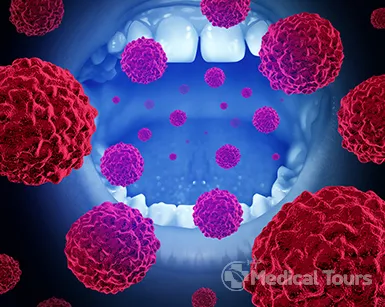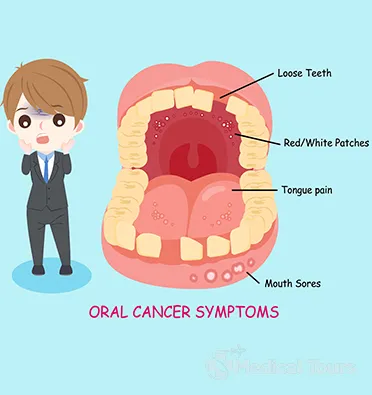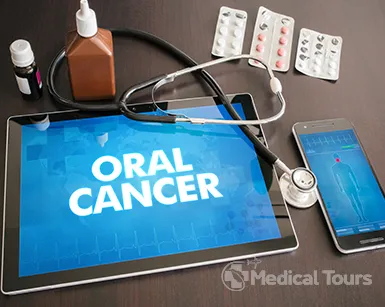Oral cancer is a malignant growth in any of the tissues of the mouth. The treatment for oral cancer in India costs around USD 3,000 (Indian Rupees approx. 2,32,794) for approx. 20 days. The price includes consultation, diagnostic tests, and chemotherapy and radiation therapy if needed.
Oral cancer is cancer that develops in the mouth, including the lips, gums, cheeks and tongue, soft and hard palate, the floor of the mouth, sinuses, and throat. Oral cancers occur among individuals who are aged over 40. Even this type of cancer is more common among men than women. It can be caused by tobacco use (both smoked and smokeless), excessive alcohol intake, infection with the human papillomavirus (HPV), and other factors. Oral cancer is 2nd most prevalent cancer in India and is the 6th leading cause of cancer death globally. In India every year approximately 1 lakh new cases of oral cancers are detected. But, unfortunately, half of the people die within one year of detection as 60-70 percent of these cases are detected in advanced stages which is the main reason behind it the deaths.
When it comes to cancer, knowing what type you have is a big deal. Not only does it help you figure out the best treatment options, but it also gives you an idea of how likely your cancer is to spread and what kind of treatments will work best for it. Here are the main types of oral cancers:
The symptoms of oral cancer can vary from person to person, but it’s important to remember that if any of the below occur, visit your physician immediately.
There is no guaranteed way to prevent oral cancer, but there are several factors that have been identified as increasing the risk of developing it. The following factors are known to affect the risk of developing oral cancer:
Oral cancers are often difficult to detect and diagnose since they don't always cause signs or symptoms. There are various tests used to detect and diagnose oral cancers, and your dentist can help determine if you should undergo any of these options. The most common tests for oral cancer include:
Staging is a very important part of the treatment process. It helps in choosing the right treatment option depending on the extent of the spread of cancer. If a biopsy is indicative of cancer, imaging studies are the next step. Imaging studies help in staging and planning treatment accordingly. Various stages of oral cancer include:
The treatment of Oral cancer lies on a variety of factors, including the stage of cancer, its location, and the patient’s medical condition. Overall, various combination of different modes of treatment is necessary. These may include various surgical and non-surgical treatments such as:
If you have survived cancer, it is very important to be in regular follow-up after cancer treatment. This check-up is done to detect future recurrences at the earliest. At each follow-up visit, the oncologist will examine you and review your past medical and surgical history. Imaging may be required based on tumor stage, symptoms, and response to treatment. Follow-up is done at 2-3 months for the initial 2 years 3-6 monthly for the next 3 years and annually thereafter. Various precautions can be taken such as:
There are many hospitals across India. But some places provide the best treatment for oral cancer. You should choose a hospital that has a reputation for treating all types of cancer. A well-known cancer hospital will employ the best and most experienced doctors. Some of them are listed below:
This is the fourth most common cause of cancer in women but in some parts of our country, it is one of the commonest cancer in women.
The warning signs of oral cancer include Persistent ulcer for more than 3 weeks, Growth / rough area inside the mouth, White patch or red patch, sudden fall of the tooth, altered speech, Difficulty in eating, Pain at the backside of the throat radiating to the ear, and Neck swelling.
A self-oral examination, even if it is done once a month, can help you detect mouth and neck abnormalities. Common signs of problems include lumps and loose teeth and sockets, as well as white or red patches on the lining of the mouth. This is why it is important to look out for any changes in your mouth whenever you take a close look at yourself in the mirror.
Yes, oral cancer is treatable. However, early detection is important. The earlier the oral cancer is caught, the easier it is to treat.
Smokers and people who drink alcohol regularly are at a higher risk of getting oral cancer. Quitting tobacco and reducing alcohol intake, having a healthier lifestyle, practicing safe and healthy sex habits, reducing your exposure to UV light, and undergoing regular oral cancer screening can help reduce this risk.
The main common type of cancer is squamous cell carcinoma as it covers more than 90 percent of cancers that occur in the oral cavity.
Detection of oral cancer is critical in helping to prolong life and improve the odds of treatment success. Early detection and early beginning of therapy can significantly diminish the mortality rate in oral cancer.
It is important to know the location of cancer, and its first or second stage before you start treatment. Early diagnosis of oral cancer has a higher chance of survival. The 5-year survival rate for localized oral cancer is approximately 80 percent.
The 5-year survival rate is one of the most important statistics when it comes to cancer diagnosis and treatment. It shows the percentage of patients who live at least 5 years after their cancer has been diagnosed.


